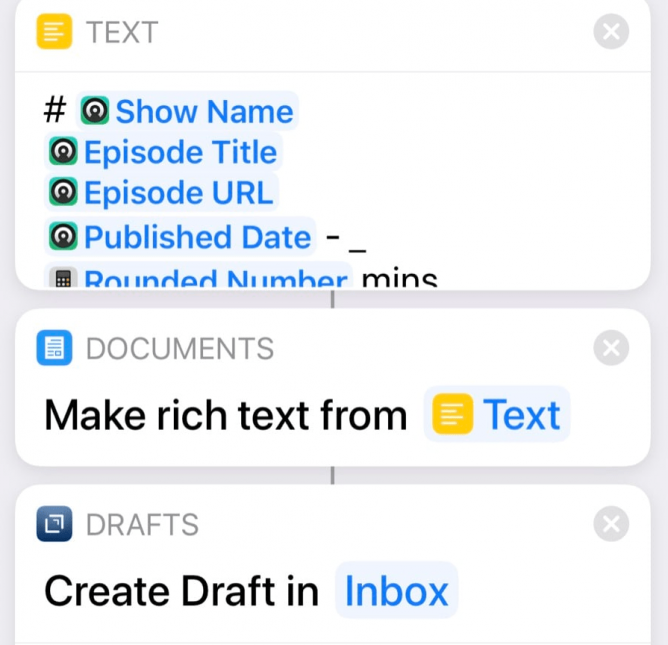After reading the great article in the Observer Michael Sandel: ‘The populist backlash has been a revolt against the tyranny of merit’ I subscribed to the podcast.
The best thing about the podcast is how Michael Sandel, summarises and pushed the arguments on without any delay.
I am enjoying listing to podcasts again now I am commuting once more.
Tag: podcast
I found the Castro Podcast Player sideload function rips youtube to audio, saves that to a m4a in your iCloud/Castro folder and then you can then add it to your Queue. A nice alternative to huffduff-video.
Podcast Listening Notes

In normal times I listen to podcasts. As I do this on a commute I’ve only listened to 2 episodes since schools shut. I miss it.
When listening I often want to remember something for later, perhaps for a blog post or like, usually this ends in frustration as my memory fails. I imagined a podcast player that had voice control and would let you make voice notes. Today this imagining came true.
Castro, the podcast app I use, had an update. This includes a pile of very welcome Siri integration which will help with hands free problems.
Even better the addition of shortcuts and one of the examples gathers info about the current playing episode and allows you speak a note. This is collated with data about the episode, podcast name, Castro url, show notes, position and saved into a New note.
I managed to edit the shortcut to get the information into Drafts instead. I’ve tested it a few times and I am now good to go when commuting starts again on 11 August.
Listened: Tes Scotland Podcast, Episode 4: Chris Smith
Henry Hepburn, @Henry_Hepburn interviews Chris Smith, @aap03102, This was a pretty delightful listen for all sorts of reasons. Chris shows a healthy dislike of inservice days;-)
I particularly like the idea that his subject, maths, could be of interest to pupils in itself. Lessons, and activities don’t always need be part of a project, although Chris talked about great ones, or in preparation for a career.
10. Raymond Chandler – The High Window – Backlisted
Poking through the Backlisted backlist, this is a joy.
Following a highly publicised run-in with the police, George looks at the fraught relationship between his community and law enforcers.
Well out of my usual ball park, fascinating episode. A lot of time in the edit I’d guess.
I have created a podcast which is linked to this post (about 4 minutes long) discussing some recent microblogging experiences of mine, and I refer to a “secret project” related to microblogging – take a listen and see if you want to participate (tease!)… http://andysylvester.com/wp-content/...
🎧 Listened: A podcast about microblogging by @AndySylvester, Looking forward to more episodes. Also the ‘secret project’. Recorded in the car, I’ve though about trying that a few times. Going to listen (huffduffed) to episode 1 to see if there are tips.
Listened: Tide Episode #107: Decentralised and ethical tech 🎧
The first long podcast I’ve listend to in a while as I’ve mostly been listening to microcasts (some great ones listed on Microcast.club).
I’ve known Doug & Dai for a good few years, although I don’t think I’ve meet Dai in person, so it is nice to hear the informal chat going weaving round the edu (and not so edu) tech.
The most interesting link for me was PixelFed a federated image sharing platform, powered by the ActivityPub protocol. An instragam like service avoiding some of the drawbacks of instagram. I signed up, johnjohnston on PixelFed. It looks early days, but a not-yet working link to an API gives me hope of the possibilities of POSSE. I am still hoping that the new version of Sunlit will fill Instagram space for me, but I’ll try PixelFed for a while.
Thanks Fearghal, huffduffed for the commute.
A bulb lit when @adamprocter mentioned that delightful design includes ethical elements that you can’t see in the interface.
